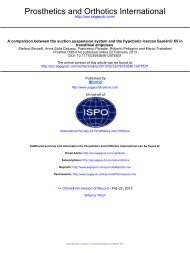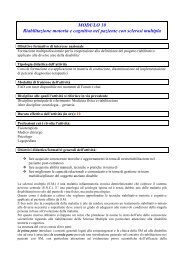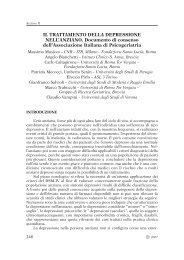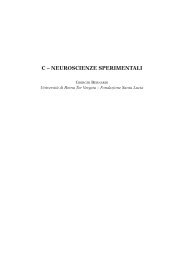- Page 1 and 2:
FONDAZIONE SANTA LUCIA ISTITUTO DI
- Page 3 and 4:
INDICE Pag. PRESENTAZIONE 1 INTRODU
- Page 5 and 6:
Indice - A comparison of the pharma
- Page 7 and 8:
Con le strutture logistiche in suo
- Page 9 and 10:
Presentazione Dal punto di vista de
- Page 11 and 12:
Ogni anno, dal 1985/86, l’Ospedal
- Page 13 and 14:
Introduzione Il complesso di attivi
- Page 15 and 16:
Dati planimetrici
- Page 17 and 18:
➔ ➔ ➔ 2006 17
- Page 19 and 20:
Dati planimetrici Poliambulatorio m
- Page 21 and 22:
AEROFOTOGRAFIA ANNO 2003 2006 21
- Page 23 and 24:
Dati planimetrici SVILUPPO EDILIZIO
- Page 25 and 26:
Dati planimetrici 2. ottimizzazione
- Page 27 and 28:
Dati planimetrici Il nuovo fabbrica
- Page 29 and 30:
Dati planimetrici Per quel che atti
- Page 31 and 32:
Dati planimetrici DATI PLANIMETRICI
- Page 33 and 34:
AEROFOTOGRAFIA ANNO 2003 2006 33
- Page 35 and 36:
Fondazione Santa Lucia Casa Dago Vi
- Page 37 and 38:
Dati planimetrici 2006 37
- Page 39 and 40:
Struttura organizzativa
- Page 41 and 42:
Struttura organizzativa Comitato Et
- Page 43 and 44:
Assistenza spirituale Servizi socio
- Page 45 and 46:
Neurologia clinica e comportamental
- Page 47 and 48:
Struttura organizzativa sivi confer
- Page 49 and 50:
Struttura organizzativa REGOLAMENTO
- Page 51 and 52:
Struttura organizzativa Il rapporto
- Page 53 and 54:
Struttura organizzativa Art. 10 - I
- Page 55 and 56:
Struttura organizzativa Specialisti
- Page 57 and 58:
Le modalità di erogazione e le alt
- Page 59 and 60:
Struttura organizzativa Art. 25 - R
- Page 61 and 62:
Struttura organizzativa L’Istitut
- Page 63 and 64:
Struttura organizzativa DELIBERA DI
- Page 65 and 66:
Struttura organizzativa - dalla est
- Page 67 and 68:
Struttura organizzativa REGOLAMENTO
- Page 69 and 70:
Struttura organizzativa Art. 5 - Pr
- Page 71 and 72:
Struttura organizzativa 6.2. Lo Spo
- Page 73 and 74:
Struttura organizzativa Allegato 1
- Page 75 and 76:
Struttura organizzativa Modello 1 1
- Page 77 and 78:
Struttura organizzativa Allegato 2
- Page 79 and 80:
Struttura organizzativa zione del s
- Page 81 and 82:
Struttura organizzativa FOGLIO INFO
- Page 83 and 84:
Struttura organizzativa ritirarsi d
- Page 85 and 86:
Struttura organizzativa MODULO CONS
- Page 87 and 88:
Dati statistici sull’attività as
- Page 89 and 90:
Dati statistici sull’attività as
- Page 91 and 92:
Dati statistici sull’attività as
- Page 93 and 94:
Dati statistici sull’attività as
- Page 95 and 96:
97 Bronchite e asma, età > 17 senz
- Page 97 and 98:
Dati statistici sull’attività as
- Page 99 and 100:
Servizio di documentazione e biblio
- Page 101 and 102:
Servizio di documentazione e biblio
- Page 103 and 104:
Servizio di documentazione e biblio
- Page 105 and 106:
Servizio di documentazione e biblio
- Page 107 and 108:
Servizio di documentazione e biblio
- Page 109 and 110:
Servizio di documentazione e biblio
- Page 111 and 112:
Servizio di documentazione e biblio
- Page 113 and 114:
Servizio di documentazione e biblio
- Page 115 and 116:
Servizio di documentazione e biblio
- Page 117 and 118:
Servizio di documentazione e biblio
- Page 119 and 120:
Servizio di documentazione e biblio
- Page 121 and 122:
Servizio di documentazione e biblio
- Page 123 and 124:
Servizio di documentazione e biblio
- Page 125 and 126:
Servizio di documentazione e biblio
- Page 127 and 128:
Servizio di documentazione e biblio
- Page 129 and 130:
Servizio di documentazione e biblio
- Page 131 and 132:
Servizio di documentazione e biblio
- Page 133 and 134:
Servizio di documentazione e biblio
- Page 135 and 136:
Servizio di documentazione e biblio
- Page 137 and 138:
Servizio di documentazione e biblio
- Page 139 and 140:
Servizio di documentazione e biblio
- Page 141 and 142:
Servizio di documentazione e biblio
- Page 143 and 144:
Servizio di documentazione e biblio
- Page 145 and 146:
Servizio di documentazione e biblio
- Page 147 and 148:
Servizio di documentazione e biblio
- Page 149 and 150:
Servizio di documentazione e biblio
- Page 151 and 152:
Servizio di documentazione e biblio
- Page 153 and 154:
Servizio di documentazione e biblio
- Page 155 and 156:
Servizio di documentazione e biblio
- Page 157 and 158:
Collaborazioni scientifiche
- Page 159 and 160:
Collaborazioni scientifiche - Unive
- Page 161 and 162:
Collaborazioni scientifiche PROTOCO
- Page 163 and 164:
Collaborazioni scientifiche ACCORDO
- Page 165 and 166:
Collaborazioni scientifiche Art. 10
- Page 167 and 168:
Collaborazioni scientifiche CONVENZ
- Page 169 and 170:
Collaborazioni scientifiche Art. 7
- Page 171 and 172:
Art. 17 - La presente Convenzione
- Page 173 and 174:
Collaborazioni scientifiche favorir
- Page 175 and 176:
comunicazioni aventi per oggetto il
- Page 177 and 178:
Collaborazioni scientifiche Art. 3
- Page 179 and 180:
Collaborazioni scientifiche CONVENZ
- Page 181 and 182:
Collaborazioni scientifiche Art. 4
- Page 183 and 184:
Collaborazioni scientifiche CONVENZ
- Page 185:
Attività didattica e formativa
- Page 188 and 189:
Sezione II - Corso teorico-pratico,
- Page 190 and 191:
Sezione II CONVENZIONE DI TIROCINIO
- Page 192 and 193:
Sezione II PROTOCOLLO D’INTESA pe
- Page 194 and 195:
Sezione II Allegato A Strutture ed
- Page 196 and 197:
Sezione II delibera del Consiglio d
- Page 198 and 199:
Sezione II CONVENZIONE L’Universi
- Page 200 and 201:
Sezione II Art. 10 - Eventuali modi
- Page 202 and 203:
Sezione II - le strutture aziendali
- Page 204 and 205:
Sezione II - mantenere la necessari
- Page 206 and 207:
Borse di studio
- Page 208 and 209:
Borse di studio scenza di P2Y 12 si
- Page 210 and 211:
Borse di studio intensità su spess
- Page 212 and 213:
Borse di studio Elaborazione della
- Page 214 and 215:
Borse di studio tern di reattività
- Page 216 and 217:
Borse di studio Misure di variabili
- Page 218 and 219:
Borse di studio Studio dell’eccit
- Page 220 and 221:
Borse di studio Studio dei meccanis
- Page 222 and 223:
Borse di studio Identificazione e c
- Page 224 and 225:
Borse di studio Conclusioni I risul
- Page 226 and 227:
Borse di studio nald W.I., Compston
- Page 228 and 229:
Borse di studio a) false credenze d
- Page 230 and 231:
Borse di studio Interazioni molecol
- Page 232 and 233:
Borse di studio Effetti dell’ecci
- Page 234 and 235:
Borse di studio Ruolo delle interaz
- Page 236 and 237:
Borse di studio Effetti della sommi
- Page 238 and 239:
Borse di studio microscopio ad epif
- Page 240 and 241:
Borse di studio professionali e sco
- Page 242 and 243:
Borse di studio pio per sopravviver
- Page 244 and 245:
Borse di studio acquisiscono alcune
- Page 246 and 247:
Borse di studio metilate rimangono
- Page 248 and 249:
Borse di studio chiaro esempio è r
- Page 250 and 251:
Borse di studio apoptotica Bcl-xS.
- Page 252 and 253:
5. Otto soggetti (7 uomini) senza s
- Page 254 and 255:
Borse di studio Ruolo dei recettori
- Page 256 and 257:
Borse di studio somministrazione di
- Page 258 and 259:
Borse di studio (struttura residenz
- Page 260 and 261:
Borse di studio distanza/velocità
- Page 262 and 263:
Borse di studio Caratterizzazione c
- Page 264 and 265:
Borse di studio Caratterizzazione f
- Page 266 and 267:
Borse di studio 2002, Neuroscience
- Page 268 and 269:
Borse di studio tra viventi (16 fru
- Page 270 and 271:
Sezione II Da anni la Fondazione Sa
- Page 272 and 273:
Sezione II * 3-3 Seminario, Prof.ss
- Page 274 and 275:
Sezione II 14-6 Riunione dei soci f
- Page 276 and 277:
Sezione II 6-11 Presentazione, ASP
- Page 278 and 279:
Sezione II Sostanziale attività ch
- Page 280 and 281:
Sezione II 12. Analisi quantitativa
- Page 282 and 283:
BLED - BATTERIA SUL LINGUAGGIO DELL
- Page 284 and 285:
DEPRESSIONE E DEMENZA RICCARDO TORT
- Page 286 and 287:
FIELD TESTS FOR EVALUATING ELITE WH
- Page 288 and 289:
INFEZIONI DA STAPHYLOCOCCUS AUREUS
- Page 290 and 291:
Infezioni da Staphylococcus Aureus
- Page 292 and 293:
Sezione II: Percorsi diagnostici e
- Page 294 and 295:
PAROLE IN CORSO Materiali per il re
- Page 296 and 297:
PROGETTO MOVIMENTO E SALUTE Consigl
- Page 298 and 299:
LA VALUTAZIONE DEL DETERIORAMENTO C
- Page 300 and 301:
La valuazione del deterioramento co
- Page 302 and 303:
Sezione II 2004 2005 2006 Pubblicaz
- Page 304 and 305:
Sezione II - J Am Soc Nephrol 7,240
- Page 306 and 307:
Sezione II PUBBLICAZIONI RECENSITE
- Page 308 and 309:
Sezione II 14. BARCA L., BURANI C.,
- Page 310 and 311:
Sezione II 27. BRUSA L., PETTA F.,
- Page 312 and 313:
Sezione II 42. CENTONZE D., ROSSI S
- Page 314 and 315:
Sezione II 57. CURSI S., RUFINI A.,
- Page 316 and 317:
Sezione II 74. DI RUSSO F., COMMITT
- Page 318 and 319:
Sezione II 90. FLORENZANO F., VISCO
- Page 320 and 321:
Sezione II International perspectiv
- Page 322 and 323:
Sezione II 121. MANGIA S., TKÁČ I
- Page 324 and 325:
Sezione II 135. MENGHINI D., HAGBER
- Page 326 and 327:
Sezione II 150. ONDER G., DELLA VED
- Page 328 and 329:
Sezione II 167. PIERELLI F., GRIECO
- Page 330 and 331:
Sezione II Aging is associated with
- Page 332 and 333:
Sezione II 197. SPALLETTA G., BOSSU
- Page 334 and 335:
Sezione II 211. TRABALLESI M., PORC
- Page 336 and 337:
Sezione II 228. VOLONTÉ C., AMADIO
- Page 338 and 339:
Sezione II ALTRE PUBBLICAZIONI 1. C
- Page 340 and 341:
Sezione II 4. SERRA L., PERRI R., C
- Page 342 and 343:
Sezione II 7. COSTA C., DI FILIPPO
- Page 344 and 345:
Sezione II 21. ZIMMER U., MACALUSO
- Page 346 and 347:
Sezione II POSTER 1. BARBAN F., COS
- Page 348 and 349:
Brevetti
- Page 350 and 351:
➙➙ ➡ Sezione II: Brevetti Ogg
- Page 352 and 353:
Sezione II: Brevetti La malnutrizio
- Page 354 and 355:
SEZIONE III
- Page 356 and 357:
Sezione III: Settori di ricerca L
- Page 358 and 359:
LINEE DI RICERCA A. Neurologia clin
- Page 360 and 361:
Sezione III: Attività per linea di
- Page 362 and 363:
Sezione III: Attività per linea di
- Page 364 and 365:
Sezione III: Attività per linea di
- Page 366 and 367:
Sezione III: Attività per linea di
- Page 368 and 369:
Sezione III: Attività per linea di
- Page 370 and 371:
Sezione III: Attività per linea di
- Page 372 and 373:
Sezione III: Attività per linea di
- Page 374 and 375:
Sezione III: Attività per linea di
- Page 376 and 377:
Sezione III: Attività per linea di
- Page 378 and 379:
Sezione III: Attività per linea di
- Page 380 and 381:
Sezione III: Attività per linea di
- Page 382 and 383:
Sezione III: Attività per linea di
- Page 384 and 385:
Sezione III: Attività per linea di
- Page 386 and 387:
Sezione III: Attività per linea di
- Page 388 and 389:
Sezione III: Attività per linea di
- Page 390 and 391:
Sezione III: Attività per linea di
- Page 392 and 393:
Sezione III: Attività per linea di
- Page 394 and 395:
Sezione III: Attività per linea di
- Page 396 and 397:
Sezione III: Attività per linea di
- Page 398 and 399:
Sezione III: Attività per linea di
- Page 400 and 401:
Sezione III: Attività per linea di
- Page 402 and 403:
Sezione III: Attività per linea di
- Page 404 and 405:
Sezione III: Attività per linea di
- Page 406 and 407:
Sezione III: Attività per linea di
- Page 408 and 409:
Sezione III: Attività per linea di
- Page 410 and 411:
Sezione III: Attività per linea di
- Page 412 and 413:
Sezione III: Linea di ricerca corre
- Page 414 and 415:
Sezione III: Linea di ricerca corre
- Page 416 and 417:
Sezione III: Linea di ricerca corre
- Page 418 and 419:
Sezione III: Linea di ricerca corre
- Page 420 and 421:
Sezione III: Linea di ricerca corre
- Page 422 and 423:
Sezione III: Linea di ricerca corre
- Page 424 and 425:
Sezione III: Linea di ricerca corre
- Page 426 and 427:
Sezione III: Linea di ricerca corre
- Page 428 and 429:
Sezione III: Linea di ricerca corre
- Page 430 and 431:
Sezione III: Linea di ricerca corre
- Page 432 and 433:
Sezione III: Linea di ricerca corre
- Page 434 and 435:
Sezione III: Linea di ricerca corre
- Page 436 and 437:
C - NEUROSCIENZE SPERIMENTALI GIORG
- Page 438 and 439:
Neuroscienze sperimentali Articolaz
- Page 440 and 441:
Neuroscienze sperimentali ambienti
- Page 442 and 443:
e sottocorticali, ci si propone di
- Page 444 and 445:
Neuroscienze sperimentali - Analizz
- Page 446 and 447:
In particolare, consideriamo che ca
- Page 448 and 449:
Neuroscienze sperimentali In partic
- Page 450 and 451:
Neuroscienze sperimentali zioni ext
- Page 452 and 453:
Neuroscienze sperimentali sinaptica
- Page 454 and 455:
Risultati acquisiti Neuroscienze sp
- Page 456 and 457:
Neuroscienze sperimentali aumento d
- Page 458 and 459:
di immunoistochimica (utilizzo dell
- Page 460 and 461:
Neuroscienze sperimentali e dopo l
- Page 462 and 463:
Neuroscienze sperimentali city Resp
- Page 464 and 465:
Neuroscienze sperimentali Per verif
- Page 466 and 467:
Proposta sperimentale Analizzeremo
- Page 468 and 469:
Neuroscienze sperimentali che alter
- Page 470 and 471:
Neuroscienze sperimentali finata ca
- Page 472 and 473:
Neuroscienze sperimentali getti san
- Page 474 and 475:
Neuroscienze sperimentali regione d
- Page 476 and 477:
Sezione III: Linea di ricerca corre
- Page 478 and 479:
Sezione III: Linea di ricerca corre
- Page 480 and 481:
Sezione III: Linea di ricerca corre
- Page 482 and 483:
Sezione III: Linea di ricerca corre
- Page 484 and 485:
Sezione III: Linea di ricerca corre
- Page 486 and 487:
Sezione III: Linea di ricerca corre
- Page 488 and 489:
Sezione III: Linea di ricerca corre
- Page 490 and 491:
Sezione III: Linea di ricerca corre
- Page 492 and 493:
Sezione III: Linea di ricerca corre
- Page 494 and 495:
Sezione III: Linea di ricerca corre
- Page 496 and 497:
Sezione III: Linea di ricerca corre
- Page 498 and 499:
Sezione III: Linea di ricerca corre
- Page 500 and 501:
Sezione III: Linea di ricerca corre
- Page 502 and 503:
Sezione III: Linea di ricerca corre
- Page 504 and 505:
Sezione III: Linea di ricerca corre
- Page 506 and 507:
Sezione III: Linea di ricerca corre
- Page 508 and 509:
Sezione III: Linea di ricerca corre
- Page 510 and 511:
Sezione III: Linea di ricerca corre
- Page 512 and 513:
Sezione III: Linea di ricerca corre
- Page 514 and 515:
Sezione III: Linea di ricerca corre
- Page 516 and 517:
Sezione III: Linea di ricerca corre
- Page 518 and 519:
Sezione III: Linea di ricerca corre
- Page 520 and 521:
Sezione III: Linea di ricerca corre
- Page 522 and 523:
Sezione III: Linea di ricerca corre
- Page 524 and 525:
Sezione III: Linea di ricerca corre
- Page 526 and 527:
Sezione III: Linea di ricerca corre
- Page 528 and 529:
Sezione III: Linea di ricerca corre
- Page 530 and 531:
Sezione III: Linea di ricerca corre
- Page 532 and 533:
Sezione III: Linea di ricerca corre
- Page 534 and 535:
F - NEUROIMMAGINI EMILIANO MACALUSO
- Page 536 and 537:
Neuroimmagini Diversi aspetti dello
- Page 538 and 539:
Neuroimmagini Obiettivi Ci proponia
- Page 540 and 541:
Neuroimmagini - Bartzokis G., Cummi
- Page 542 and 543:
Neuroimmagini Descrizione Nella vit
- Page 544 and 545:
Neuroimmagini Nel nostro esperiment
- Page 546 and 547:
Neuroimmagini Risultati acquisiti D
- Page 548 and 549:
Neuroimmagini buto dello stimolo. L
- Page 550 and 551:
Neuroimmagini nente al proprio repe
- Page 552 and 553:
Neuroimmagini ges; Kwong et al., 19
- Page 554 and 555:
Neuroimmagini piccola parte di neur
- Page 556 and 557:
Neuroimmagini F.3.2 - Tecniche DTI
- Page 558 and 559:
Neuroimmagini miste. Attualmente, n
- Page 560 and 561:
Neuroimmagini 10. Okamura N., Arai
- Page 562 and 563:
Sezione III: Linea di ricerca corre
- Page 564 and 565:
Sezione III: Linea di ricerca corre
- Page 566 and 567:
Sezione III: Linea di ricerca corre
- Page 568 and 569: Sezione III: Linea di ricerca corre
- Page 570 and 571: Sezione III: Linea di ricerca corre
- Page 572 and 573: Sezione III: Linea di ricerca corre
- Page 574 and 575: Sezione III: Linea di ricerca corre
- Page 576 and 577: Sezione III: Linea di ricerca corre
- Page 578 and 579: Sezione III: Linea di ricerca corre
- Page 580 and 581: Sezione III: Linea di ricerca corre
- Page 582 and 583: ANALISI ELETTROFISIOLOGICA, BIOLOGI
- Page 584 and 585: Analisi elettrofisiologica, biologi
- Page 586 and 587: Analisi elettrofisiologica, biologi
- Page 588 and 589: Analisi elettrofisiologica, biologi
- Page 590 and 591: Analisi elettrofisiologica, biologi
- Page 592 and 593: Analisi elettrofisiologica, biologi
- Page 594 and 595: Analisi elettrofisiologica, biologi
- Page 596 and 597: Analisi elettrofisiologica, biologi
- Page 598 and 599: Analisi elettrofisiologica, biologi
- Page 600 and 601: A COMPARISON OF THE PHARMACOLOGICAL
- Page 602 and 603: A comparison of the pharmacological
- Page 604 and 605: CROSS-TALK BETWEEN NON RECEPTOR TYR
- Page 606 and 607: Cross-talk between non receptor tyr
- Page 608 and 609: Cross-talk between non receptor tyr
- Page 610 and 611: Cross-talk between non receptor tyr
- Page 612 and 613: Cross-talk between non receptor tyr
- Page 614 and 615: Cross-talk between non receptor tyr
- Page 616 and 617: Cross-talk between non receptor tyr
- Page 620 and 621: Cross-talk between non receptor tyr
- Page 622 and 623: Cross-talk between non receptor tyr
- Page 624 and 625: Sezione III: Attività per progetti
- Page 626 and 627: Sezione III: Attività per progetti
- Page 628 and 629: Sezione III: Attività per progetti
- Page 630 and 631: Sezione III: Attività per progetti
- Page 632 and 633: Sezione III: Attività per progetti
- Page 634 and 635: Sezione III: Attività per progetti
- Page 636 and 637: Sezione III: Attività per progetti
- Page 638 and 639: Sezione III: Attività per progetti
- Page 640 and 641: Sezione III: Attività per progetti
- Page 642 and 643: DISTURBI DEL CONTROLLO MOTORIO E CA
- Page 644 and 645: Disturbi del controllo motorio e ca
- Page 646 and 647: Disturbi del controllo motorio e ca
- Page 648 and 649: 2. Cross-sectional integration of
- Page 650 and 651: Tasks 1. Background survey from ava
- Page 652 and 653: WP 1B15/2 - Vibromechanical stimuli
- Page 654 and 655: Disturbi del controllo motorio e ca
- Page 656 and 657: E-LEARNING IN NEURORIABILITAZIONE F
- Page 658 and 659: E-learning in neuroriabilitazione.
- Page 660 and 661: E-learning in neuroriabilitazione.
- Page 662 and 663: E-learning in neuroriabilitazione.
- Page 664 and 665: ESOCITOSI GLUTAMMATERGICA E CROSS-T
- Page 666 and 667: Esocitosi glutammatergica e cross-t
- Page 668 and 669:
Esocitosi glutammatergica e cross-t
- Page 670 and 671:
Esocitosi glutammatergica e cross-t
- Page 672 and 673:
Sezione III: Attività per progetti
- Page 674 and 675:
Sezione III: Attività per progetti
- Page 676 and 677:
Sezione III: Attività per progetti
- Page 678 and 679:
Sezione III: Attività per progetti
- Page 680 and 681:
Sezione III: Attività per progetti
- Page 682 and 683:
Sezione III: Attività per progetti
- Page 684 and 685:
Sezione III: Attività per progetti
- Page 686 and 687:
Sezione III: Attività per progetti
- Page 688 and 689:
Sezione III: Attività per progetti
- Page 690 and 691:
Sezione III: Attività per progetti
- Page 692 and 693:
Sezione III: Attività per progetti
- Page 694 and 695:
Sezione III: Attività per progetti
- Page 696 and 697:
Sezione III: Attività per progetti
- Page 698 and 699:
Sezione III: Attività per progetti
- Page 700 and 701:
MECCANISMI DI DANNO NEURONALE ALLA
- Page 702 and 703:
Meccanismi di danno neuronale alla
- Page 704 and 705:
Meccanismi di danno neuronale alla
- Page 706 and 707:
Meccanismi di danno neuronale alla
- Page 708 and 709:
Meccanismi di danno neuronale alla
- Page 710 and 711:
Meccanismi di danno neuronale alla
- Page 712 and 713:
Meccanismi di danno neuronale alla
- Page 714 and 715:
Meccanismi di danno neuronale alla
- Page 716 and 717:
Meccanismi di danno neuronale alla
- Page 718 and 719:
QUALITÀ DELLA VITA DEL TRAUMATIZZA
- Page 720 and 721:
Qualità della vita del traumatizza
- Page 722 and 723:
Qualità della vita del traumatizza
- Page 724 and 725:
RIABILITAZIONE NEUROMOTORIA E NUOVE
- Page 726 and 727:
Riabilitazione neuromotoria e nuove
- Page 728 and 729:
Sezione III: Attività per progetti
- Page 730 and 731:
STUDIO DEL RUOLO DEGLI ZUCCHERI NEL
- Page 732 and 733:
Studio del ruolo degli zuccheri nel
- Page 734 and 735:
Studio del ruolo degli zuccheri nel
- Page 736 and 737:
Sezione III: Attività per progetti
- Page 738 and 739:
STUDIO EPIDEMIOLOGICO SUL RISCHIO A
- Page 740 and 741:
Studio epidemiologico sul rischio a
- Page 742 and 743:
Studio epidemiologico sul rischio a
- Page 744 and 745:
Studio epidemiologico sul rischio a
- Page 746 and 747:
Studio epidemiologico sul rischio a
- Page 748 and 749:
Studio epidemiologico sul rischio a
- Page 750 and 751:
UTILIZZO DELLA VIBRAZIONE MUSCOLARE
- Page 752 and 753:
Utilizzo della vibrazione muscolare
- Page 754 and 755:
Sezione III: Attività per progetti
- Page 756 and 757:
Sezione III: Attività per progetti
- Page 758 and 759:
Sezione III: Attività per progetti
- Page 760 and 761:
Sezione III: Attività per progetti
- Page 762 and 763:
Sezione III: Attività per progetti
- Page 764 and 765:
Sezione III: Attività per progetti
- Page 766 and 767:
Sezione III: Attività per progetti
- Page 768 and 769:
Sezione III: Attività per progetti
- Page 770 and 771:
Sezione III: Attività per progetti
- Page 772:
Sezione III: Attività per progetti
















